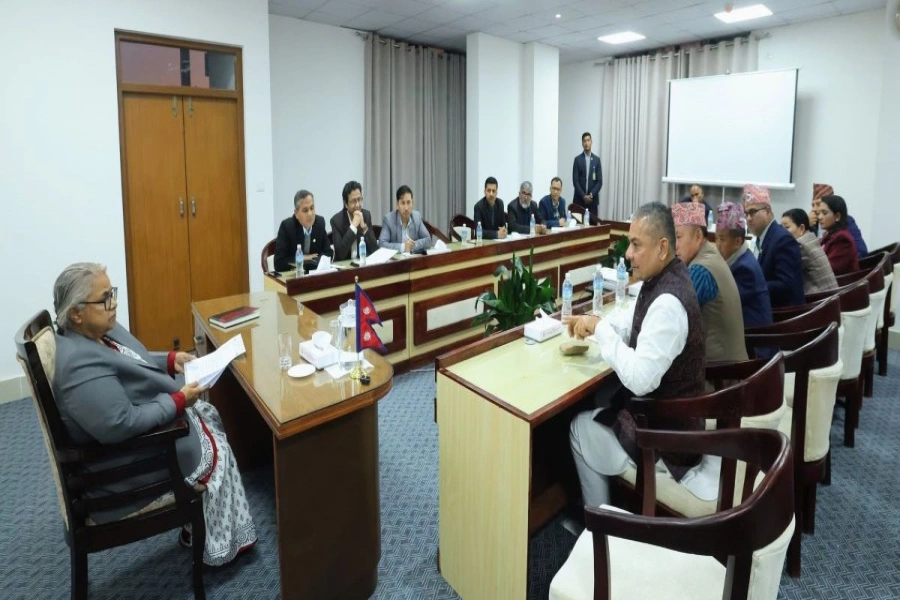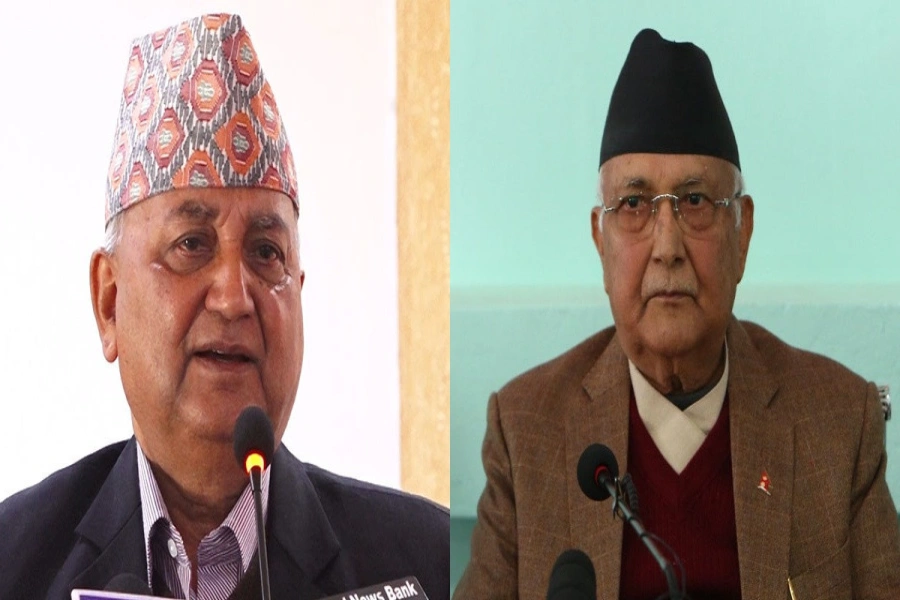In the 21st century, we bear witness to the ascent of the Creative Economy and Crypto Economy as potent forces, sculpting the contours of our economic terrain. The Creative Industries market presently commands a valuation of USD 2.7 trillion, with projections pointing to a climb to USD 3.4 trillion by 2031. Simultaneously, the aggregate market capitalization of cryptocurrencies has surged to an impressive $1.66 trillion by the culmination of 2023. In such a dynamic and innovative era, the proscription of influential platforms like TikTok, a juggernaut in the thriving creative economy, and the imposition of restrictions on cryptocurrencies in Nepal, engender disquieting concerns, particularly among the nation's youth. A discernible sentiment is taking root within the population, suggesting that the communist ideology guiding the nation for nearly two decades is teetering on the edge of inflicting irreparable damage—a concern not without merit.
The downfall of the once-mighty superpower, the Soviet Union, and the subsequent trials faced by Eastern European nations serve as poignant reminders of the inherent risks tied to the communist ideological path. Countries that were formerly under communist regimes persist in wrestling with the aftermath, striving to achieve economic prosperity amid the remnants of a system that wrought devastation. One primary factor contributing to this misstep was the attempt to reshape the economic landscape through centrally planned economies, resulting in bureaucratic inefficiencies, stifled innovation, and an inability to adapt to the dynamic nature of global markets.
The Soviet economy, once lauded as the pinnacle of central planning, ultimately stood as a testament to the misguided approach of regulating every facet of economic activity from a centralized authority. This top-down control not only impeded growth but also left nations ensnared by inefficiency. In a striking parallel, the imposition of a TikTok ban in Nepal mirrors this centralized decision-making model. For instance, akin to Soviet-style communism, a select few in Nepal's Cabinet decided on the ban without engaging in parliamentary discussions or soliciting input from crucial stakeholders such as academia, the private sector, youth, startups, and small and medium-sized businesses.The absence of inclusive deliberation raises concerns about repeating historical mistakes, wherein unilateral decisions stifled progress and innovation. This top-down approach has not only resulted in the demise of many small businesses in Nepal but has also curtailed the exposure and earnings of numerous content creators, compelling some to relocate outside the country.
Another factor contributing to the collapse of the Soviet Union was the shattered illusion of egalitarianism propagated by communism, overshadowed by political repression and human rights abuses. Totalitarian regimes, epitomized by leaders such as Lenin and Stalin, stifled dissent and trampled individual freedoms in the pursuit of an elusive utopian vision. The state machinery, ostensibly designed for equal wealth distribution, transformed into a mechanism of control, suppressing the very populace it purported to uplift. This culture of fear eroded the social fabric, fostering discontent and significantly contributing to the unraveling of the Soviet Union and its satellite states.
In Eastern European countries bound by communist ideologies, the erosion of cultural and national identities was also a significant consequence. Enforced uniformity disregarded diverse traditions, languages, and histories. The suppression of cultural autonomy bred resentment, fueling nationalist movements seeking to reclaim distinct identities. Communism's failure to recognize and respect each nation's unique character further exacerbated tensions, contributing to the disintegration of the Soviet sphere of influence. The erosion of cultural identities fueled discontent, leading to the unraveling of these once-mighty regimes. This collapse serves as a stark reminder that grand ideological visions, divorced from human nature and societal complexities, are destined to crumble under their own weight.
Lately, Nepal has witnessed a noteworthy resurgence in both Hinduism and the monarchy, evident in the increased celebrations of Hindu festivals and the growing support for political parties advocating the reinstatement of the monarchy and the establishment of a Hindu state. These concurrent cultural and political revivals are instrumental in shaping the identity of the Nepalese people, fostering a renewed sense of community. This resurgence stands in stark contrast to communism's disregard for religion, culture, history, and the glory of the founding fathers of the country.
Deficit of Pro-Bitcoin Political Leadership

Another pivotal factor contributing to the collapse of the Soviet Union was the widespread political repression, censorship, and the absence of individual freedoms within communist regimes. Citizens lived under constant surveillance, and dissent was frequently met with severe consequences. The suppression of free speech, political opposition, and independent thought created a stifling atmosphere that eroded the social fabric of these societies.
Drawing a parallel, Nepal seems to be traversing a comparable trajectory. The proposed amendment to Nepal's Telecommunication Bill, presented by the Ministry of Communication and Information Technology, omits a court order requirement for recording personal conversations and accessing individual information on mobile phones. This omission presents a substantial threat to checks and balances, enabling arbitrary data extraction for those arbitrarily labeled as "suspicious." The bill additionally bestows direct access to service providers' systems, directly infringing upon individuals' right to privacy and undermining constitutional protections—a stark reminder of Stasi-style surveillance.
Another factor that contributed to the collapse of the mighty Soviet Union was that, in its pursuit of a classless society, communism inadvertently gave rise to a new form of elitism. This resulted in a stark dichotomy between the ruling bureaucratic class and ordinary citizens. The promise of a society where wealth and privilege were to be shared equitably among all citizens crumbled in the face of an emerging elite. Party leaders and high-ranking officials, entrusted with the responsibility of steering the communist ship towards egalitarian shores, found themselves enjoying exclusive privileges, lavish lifestyles, and access to resources that remained elusive to the working masses.
The contradiction between the professed ideals of communism and the lived reality of a privileged political and bureaucratic class exemplified the inherent flaws within the system, rendering its pursuit of classlessness a paradoxical endeavor. The lack of political pluralism and absence of functioning democratic institutions contributed to an environment where the ruling elite became increasingly disconnected from the needs and aspirations of the people. This erosion of trust in the political system fueled discontent and sowed the seeds of the eventual downfall of communist regimes in the Soviet Union as well as other Eastern European countries under communism.
Communism's inadvertent formation of a bureaucratic elite heightened economic inequality, manifested in starkly contrasting living standards. The ruling class luxuriated in privileges, while common citizens grappled with scarcity, dilapidated living conditions, and restricted access to education and healthcare. This profound dichotomy undermined the system's intended goal of eradicating class distinctions.
Corruption within the communist apparatus further exacerbated inequality, as officials engaged in bribery, embezzlement, and favoritism, concentrating wealth and eroding moral legitimacy. The resultant disillusionment and resentment among the public fueled widespread discontent, contributing not only to the collapse of the Soviet Union but also to the demise of communist regimes across Eastern Europe.
To conceal the corruption and shortcomings of communism, the regime employed notorious media censorship, suppressing free expression and intellectual development while fostering fear and self-censorship. Rigorous controls on information flow manipulated public opinion, curtailing dissent and promoting a one-sided narrative. State-controlled newspapers, television, and radio functioned as propaganda instruments, limiting diverse viewpoints and hindering informed opinions. This suppression not only hampered intellectual and cultural progress but also stifled academic freedom, impeding the richness of varied perspectives.
The media ban in historical communist regimes fostered an atmosphere of fear and self-censorship, discouraging dissenting views and cultivating a culture of distrust, even in private conversations. This stifling of open discourse significantly hampered the nation's ability to openly and transparently address its challenges. Furthermore, this media ban had a profound negative impact on society, suppressing intellectual development, restricting access to diverse perspectives, and fostering an environment of fear and self-censorship. The absence of a free and open media hindered citizens' ability to engage in critical thinking, stifled intellectual and cultural progress, and created a climate of conformity that endured throughout the existence of the Soviet regime.
The recent imposition of bans on TikTok and cryptocurrencies in Nepal reflects a concerning trend reminiscent of the Soviet-style repression witnessed under historical communist regimes. Nepal’s prohibition of TikTok, a popular platform for creative expression, mirrors the suppression of artistic and intellectual freedom that characterized the Soviet Union and Eastern European countries. This echoes a pattern of stifling individual freedoms and restricting the vibrant exchange of ideas, indicative of a governance approach that seeks centralized control over cultural narratives.
Similarly, the restrictions on cryptocurrencies in Nepal align with the historical tendencies of communist economic models, emphasizing centralized control over financial systems. The limitations imposed on these decentralized digital assets evoke memories of centrally planned economies that impeded innovation and hindered economic growth. This echoes the pitfalls of a top-down approach to economic governance, a feature that contributed to the inefficiencies and ultimate downfall of the Soviet Union. Nepal is witnessing a clash between a highly centralized communist system and decentralized cryptocurrencies, rooted in conflicting ideologies—where the former underscores central control, while the latter advocates for complete decentralization.
TikTok stands as a crucial asset for global small businesses, playing a pivotal role in fostering economic growth. With an impressive presence of over 15 million businesses in Southeast Asia and UK small businesses contributing £1.6 billion to the GDP, the platform proves indispensable for entrepreneurs. However, the looming specter of a potential TikTok ban raises concerns for these businesses. Instead of opting for an outright prohibition, policymakers should consider adopting a nuanced regulatory framework that addresses concerns while safeguarding the interests of small businesses. While penalizing those misusing the platform is imperative, an outright ban risks stifling economic opportunities and curbing cultural exchange. Navigating the path of nuanced regulation is essential, cultivating a conducive and secure environment for businesses on TikTok.
In Nepal, a TikTok ban will significantly impede the country's potential to benefit from the creative economy. The platform serves as a powerful tool for creative expression, allowing individuals and businesses to showcase their talents, products, and cultural richness. Restricting access to TikTok in Nepal could stifle a vibrant creative community, hindering opportunities for economic growth, cultural exchange, and global visibility. A more nuanced approach that addresses concerns while preserving the positive contributions of TikTok may better serve the interests of Nepal's creative economy.
The outright ban on TikTok, orchestrated by a select few in the cabinet, highlights the limitations of representative democracy. A growing number argue in favor of direct democracy as a superior alternative, a sentiment particularly resonant among the youth. They believe that the martyrs who valiantly fought for democracy envisioned a system where the government would refrain from infringing upon the people's fundamental rights.








































